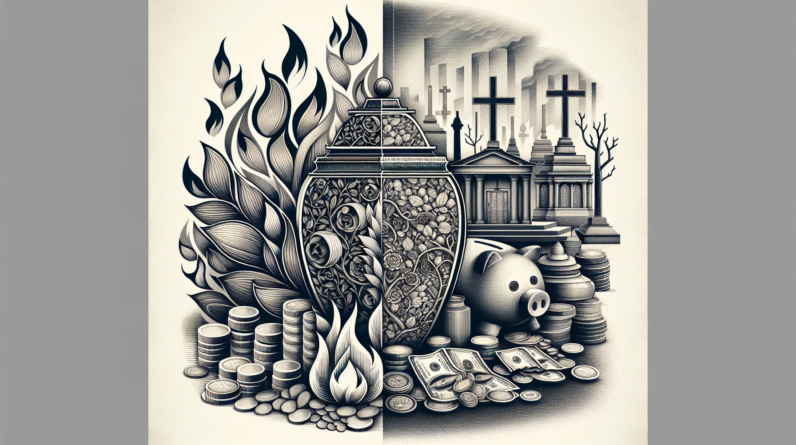
Thinking about cremation can be a sensitive subject, but it’s important to be prepared. If you’re considering this option for yourself or a loved one, it’s crucial to know what information you’ll need. When it comes to cremation in Houston, there are a few key details to keep in mind. From the necessary paperwork to the planning process, understanding the requirements will help ensure a smooth and respectful cremation experience. So, let’s explore the essential information you’ll need for cremation in Houston.

Legal Requirements for Cremation
Cremation is a popular choice for many individuals as their preferred method of final disposition. However, before you proceed with cremation, it is important to understand the legal requirements that come along with it. By familiarizing yourself with the legal process, obtaining necessary permits, and completing required documentation, you can ensure a smooth and lawful cremation process.
Understanding the Legal Process
To begin, it is crucial to have a clear understanding of the legal process involved in cremation. In the city of Houston, like in many other places, certain legal procedures must be followed to ensure that the cremation is carried out in accordance with the law. These procedures typically involve obtaining the necessary permits and documentation.
Obtaining Necessary Permits
One of the most important legal requirements for cremation is obtaining the necessary permits. In Houston, you will need to obtain a cremation permit from the local health department or the county registrar’s office. This permit ensures that the cremation process is authorized and complies with all applicable regulations. Additionally, you may also need to secure a burial transit permit if you plan on transporting the remains to a different location.
Completing Required Documentation
In order to proceed with cremation, certain documentation must be completed. This documentation usually includes a death certificate, a cremation authorization form, and any other relevant forms required by the cremation facility or funeral home. The death certificate is typically issued by a medical professional and certifies the cause and circumstances of death. The cremation authorization form, on the other hand, grants permission for the cremation to take place and must be signed by the legal next of kin or authorized representative.
Choosing a Cremation Service Provider
Selecting a reliable and reputable cremation service provider is an essential aspect of the cremation process. By researching local cremation service providers, considering reputation and experience, and comparing costs and services, you can make an informed decision about the provider that best meets your needs.
Researching Local Cremation Service Providers
Begin by conducting thorough research on local cremation service providers in the city of Houston. Look for providers with a good reputation, positive customer reviews, and a long-standing presence in the community. Use online directories, websites, and recommendations from friends or family members who have previously used cremation services to gather information about potential providers.
Considering Reputation and Experience
When evaluating different cremation service providers, it is important to consider their reputation and experience. Look for providers who have been in business for a significant amount of time and have a proven track record of providing quality service. Reading customer reviews and testimonials can also give you valuable insights into the experiences of others who have used their services.
Comparing Costs and Services
Cost is often a significant factor when choosing a cremation service provider. However, it is essential to consider more than just the price. Take the time to compare the specific services offered by different providers and evaluate whether they align with your needs and preferences. Keep in mind that some providers may offer additional services such as memorial planning or grief support, which can greatly benefit you and your family during this challenging time.
Pre-Planning Cremation
Pre-planning cremation can alleviate a significant amount of stress and uncertainty for both you and your loved ones. By deciding on cremation as a final disposition method, making pre-need arrangements, and communicating your wishes to family, you can ensure that your desires are known and followed.
Deciding on Cremation as a Final Disposition Method
The first step in pre-planning cremation is making the decision to choose cremation as your final disposition method. This choice is a personal one and should be based on your own beliefs, preferences, and values. Consider factors such as religious or cultural traditions, environmental impact, and personal comfort when making this decision.
Making Pre-Need Arrangements
After deciding on cremation, it is advisable to make pre-need arrangements. These arrangements involve documenting your preferences for the cremation process, as well as any additional services or memorialization options you may desire. Pre-planning allows you to outline your wishes in advance and ensures that your family members do not have to make difficult decisions during a time of grief and loss.
Communicating Your Wishes to Family
Once you have made pre-need arrangements, it is crucial to communicate your wishes to your family members or loved ones. Discussing your decisions openly and honestly ensures that everyone is aware of your desires and can carry them out when the time comes. This open communication can help alleviate any potential conflicts or misunderstandings and provide your family with a sense of comfort knowing that they are fulfilling your wishes.
Obtaining and Preparing the Deceased
When it comes to cremation, there are certain steps to be taken in obtaining and preparing the deceased. By contacting a funeral home or crematory, providing essential details about the deceased, and properly preparing the deceased for cremation, you can ensure a dignified and respectful process.
Contacting a Funeral Home or Crematory
Once a loved one has passed away, it is necessary to contact a funeral home or crematory to initiate the cremation process. These professionals have the expertise and facilities to handle the necessary procedures involved in cremation. In Houston, there are several reputable funeral homes and crematories that can assist you in this regard.
Providing Essential Details about the Deceased
When contacting the funeral home or crematory, it is important to provide them with essential details about the deceased. This may include their full name, date of birth, date of death, and any other relevant information that may be required for legal or administrative purposes. This information ensures accurate identification of the deceased throughout the entire process.
Preparing the Deceased for Cremation
Before the cremation can take place, proper preparation of the deceased is necessary. This typically involves the removal of any jewelry, implants, or other items that are not suitable for cremation. The deceased is then placed in a combustible container or casket, which is designed specifically for cremation. The utmost care and respect are taken throughout this process to ensure the dignity of the deceased is maintained.
Selecting an Urn for Ashes
After the cremation process is complete, the ashes of the deceased are typically placed in an urn for final memorialization. When selecting an urn, it is important to understand the purpose of an urn, choose the right size and material, and consider any customizations or personalizations that may be desired.
Understanding the Purpose of an Urn
An urn serves as a vessel to hold the cremated remains of a loved one. It provides a final resting place and can act as a meaningful tribute to the deceased. Urns come in various styles, designs, and materials, allowing you to choose one that best reflects the personality and preferences of your loved one.
Choosing the Right Size and Material
When selecting an urn, it is crucial to choose the right size and material. The size of the urn should be based on the amount of ashes that will be placed inside it. Many urns are designed to hold the entire remains, while others are smaller and intended for sharing or dispersing a portion of the ashes. Additionally, consider the material of the urn, such as wood, metal, or ceramic, as it can contribute to the overall aesthetic and durability.
Considering Customizations and Personalization
To create a truly unique and personalized memorial for your loved one, consider any customizations or personalization options that are available. Some urns allow for engraving of names, dates, or meaningful symbols, while others can be adorned with photos or other mementos. Taking the time to personalize the urn can provide a lasting tribute and a source of comfort for family and friends.
Deciding on an Ash Scattering Plan
Ash scattering is a popular choice for many individuals who prefer a more natural and symbolic way of returning the remains to the earth. When deciding on an ash scattering plan, it is important to understand the options available, choose a meaningful location, and consider any legal or environmental factors that may apply.
Understanding Ash Scattering Options
Ash scattering can take place in various ways, depending on personal preferences and legal restrictions. It can be done at sea, in designated scattering gardens, or on private property with permission from the landowner. Some individuals choose to scatter the ashes by hand, while others opt for scattering tubes or biodegradable urns specifically designed for the purpose of scattering.
Choosing a Meaningful Location
Selecting a meaningful location for ash scattering is an important decision. Consider places that held significance for the deceased, such as a favorite park, beach, or garden. Alternatively, you may choose a location that symbolizes a connection to nature or a spiritual belief. Ensure that the selected location aligns with local regulations and obtain any necessary permissions or permits before proceeding.
Considering Legal and Environmental Factors
Before scattering ashes, it is essential to consider any legal or environmental factors that may apply. Familiarize yourself with local laws and regulations regarding ash scattering in the city of Houston to ensure that you are compliant. Additionally, take into account any environmental concerns, such as potential impact on water sources or protected areas. Respecting both legal and environmental considerations ensures that the ash scattering is conducted responsibly and without harm to the surroundings.
Planning a Memorial Service or Celebration of Life
A memorial service or celebration of life can provide comfort, closure, and an opportunity for family and friends to come together to honor the life of the deceased. When planning such an event, it is important to decide on the type of service, determine the date and venue, and incorporate personalized elements that reflect the unique qualities and preferences of the loved one.
Deciding on the Type of Service
When planning a memorial service or celebration of life, there are various options to consider. It can be a traditional funeral service, a simple gathering, or a more personalized and unique event. Think about the personality and interests of the deceased and choose a type of service that aligns with their wishes and allows family and friends to properly remember and celebrate their life.
Determining the Date and Venue
The date and venue of the memorial service or celebration of life should be carefully selected to accommodate the needs and preferences of family and friends. Consider any religious or cultural practices, as well as logistical factors such as availability of the venue and travel considerations for out-of-town guests. It is also important to provide ample notice and invitation to ensure that everyone who wishes to attend can make appropriate arrangements.
Incorporating Personalized Elements
To make the memorial service or celebration of life truly meaningful, consider incorporating personalized elements that reflect the unique qualities and interests of the loved one. This can include displaying photographs, playing their favorite music, sharing stories and memories, or even organizing activities that were meaningful to them. By personalizing the event, you create a fitting tribute that honors their life and allows attendees to connect and remember in a meaningful and personal way.
Understanding the Cremation Process
Having a basic understanding of the cremation process can help alleviate any concerns or misconceptions you may have. By knowing the overview of the process, understanding the temperature and duration of cremation, and being aware of the identification and tracking of remains, you can have peace of mind during this stage of the cremation journey.
Overview of the Cremation Process
The cremation process typically involves placing the deceased inside a cremation chamber or retort, which reaches temperatures of around 1400-1800 degrees Fahrenheit. The intense heat and flames reduce the body to bone fragments, known as “cremated remains” or “ashes.” These remains are then carefully processed to remove any remaining metal or non-combustible material, resulting in a fine powdery substance that is placed in an urn.
Temperature and Duration of Cremation
The temperature and duration of the cremation process can vary depending on factors such as the size and weight of the deceased, as well as the specific equipment and procedures used by the crematory. Generally, it takes approximately two to three hours for the complete cremation process to occur. Throughout this time, the body is subjected to high temperatures, which ensure complete combustion and the reduction of the remains to ashes.
Identification and Tracking of Remains
Crematories adhere to strict protocols to ensure the proper identification and tracking of remains throughout the cremation process. Upon arrival at the crematory, the deceased is assigned a unique identification number, which is recorded on all necessary documents and labels. This number follows the remains throughout the entire process, providing a system of checks and balances to guarantee the correct identification of the cremated remains.
Considering Religious and Cultural Practices
When arranging a cremation, it is essential to consider and respect any religious or cultural practices that may be relevant. By understanding and accommodating these practices, you can ensure that the cremation process aligns with the beliefs and traditions of the deceased and their family.
Respecting Religious Requirements
Different religions may have specific requirements or beliefs regarding cremation. For example, in Hinduism, cremation is traditionally the preferred method of final disposition. In Christianity, some denominations permit cremation while others discourage it. It is important to consult with religious leaders, such as priests, pastors, or rabbis, to understand any religious requirements or guidelines that should be followed during the cremation process.
Incorporating Cultural Traditions
Cultural traditions can also play a significant role in the cremation process. Certain cultures may have specific customs or rituals that accompany cremation, such as prayers, chants, or ceremonies. Understanding and incorporating these cultural traditions can help provide a sense of comfort and closure to the grieving family.
Seeking Guidance from Religious Leaders
If you are uncertain about how to navigate the cremation process within your religious or cultural context, it is advisable to seek guidance from religious leaders. They can provide valuable insights, answer any questions you may have, and offer guidance on how to honor the deceased while adhering to religious or cultural practices. Their expertise and support can help ensure that the cremation process is carried out respectfully and in accordance with your beliefs.
Dealing with Grief and Bereavement
Dealing with grief and bereavement is an unavoidable aspect of the cremation process. By understanding and embracing healthy coping mechanisms, seeking support from family and friends, and utilizing professional counseling services, you can navigate the grieving process with compassion and support.
Coping with the Loss of a Loved One
The loss of a loved one is a deeply personal and emotional experience, and everyone copes with grief differently. It is essential to allow yourself to grieve and process your emotions in a way that feels most comfortable to you. This may involve talking about your feelings, engaging in activities that bring you solace, or seeking solace in alone time. Acknowledge that grieving is a natural and necessary process and be patient and compassionate with yourself.
Seeking Support from Family and Friends
During the grieving process, it can be immensely helpful to seek support from family and friends. Surround yourself with loved ones who can provide emotional support, lend a listening ear, or simply be present during this challenging time. Sharing memories and stories about the deceased with others can also help you find comfort and connection in your grief. Remember, you don’t have to go through this journey alone – reach out and lean on your support network.
Utilizing Professional Counseling Services
In some cases, the grieving process may become overwhelming, and professional counseling services can provide valuable support. Grief counselors or therapists specialize in helping individuals navigate the complex emotions and challenges that come with loss. They can offer guidance, coping strategies, and a safe space to process your grief. Do not hesitate to seek professional help if you feel it would benefit you on your path towards healing.
In conclusion, understanding the legal requirements for cremation, choosing a cremation service provider, pre-planning the cremation process, obtaining and preparing the deceased, selecting an urn for ashes, deciding on an ash scattering plan, planning a memorial service or celebration of life, comprehending the cremation process, considering religious and cultural practices, and dealing with grief and bereavement are vital aspects of a comprehensive article on cremation. By following these guidelines, you can navigate the cremation process with confidence and ensure that your loved one’s final wishes are fulfilled in a respectful and meaningful manner.





